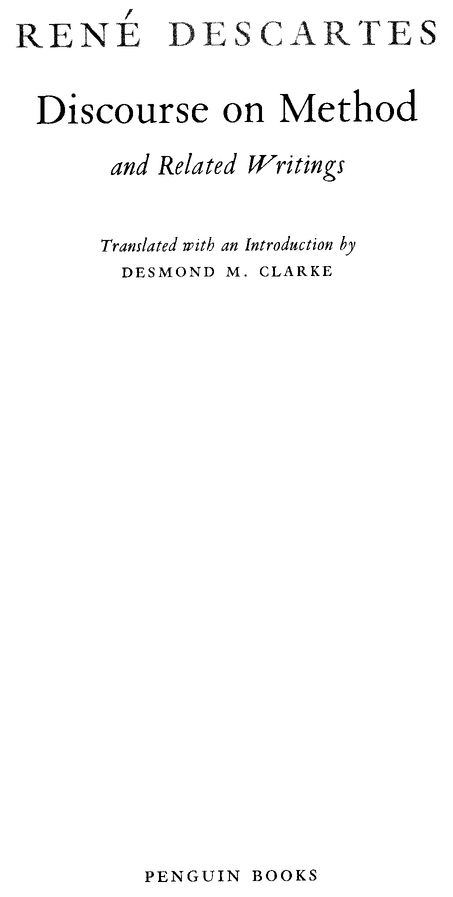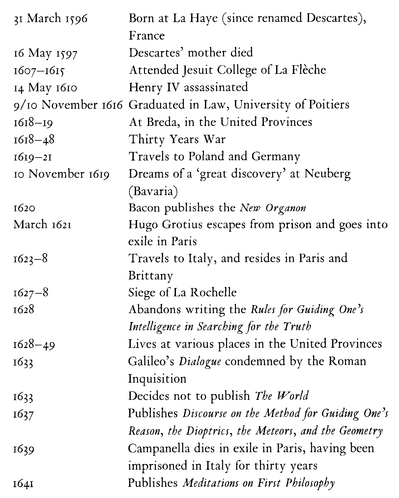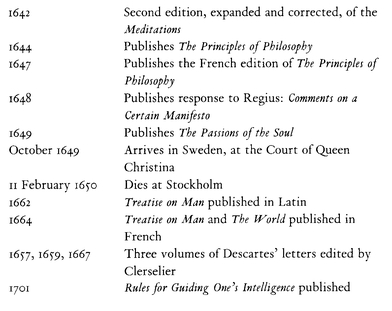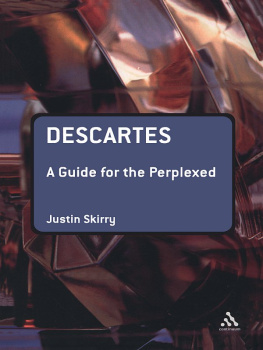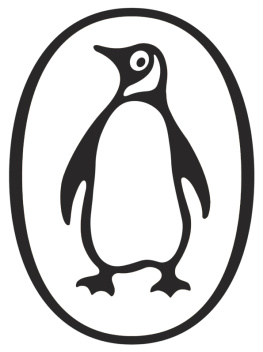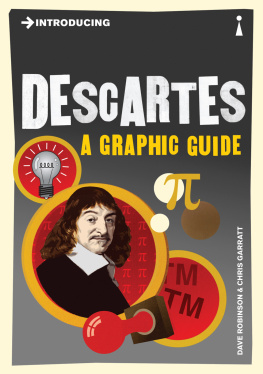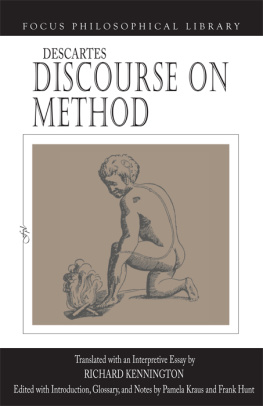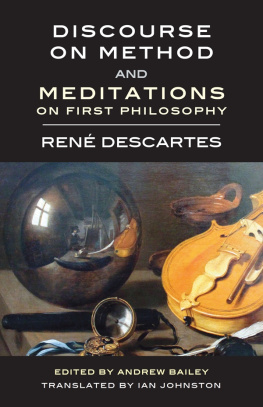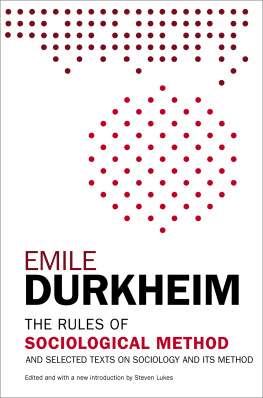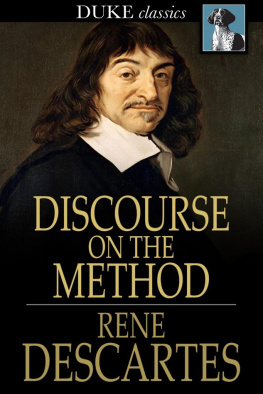Table of Contents
PENGUIN

CLASSICS
DISCOURSE ON METHOD AND RELATED WRITINGS
REN DESCARTES was born in 1596 at La Haye (now called Descartes) near Tours, and educated at the Jesuit College at La Flche. Like many of his contemporaries he contested the value of an education based on Aristotelianism and, after leaving college, attempted to resolve the sceptical crisis of his age by devising a method of reasoning modelled on the rigour and certainty of mathematics. Despite claiming to avoid theological questions and stay within the scope of human reason, his writings involved him in numerous disputes with theologians of both the Catholic and (especially) the Reformed persuasion. In 1621, after a period spent in the Netherlands, Bohemia and Hungary as a soldier, he left the army and devoted himself to the study of science and philosophy. He retired to the Netherlands in 1628 and spent the next twenty-one years there, living and working in seclusion. Then in late 1649, after an invitation the previous year, he went to Sweden to take up a post instructing Queen Christina in philosophy. Descartess habit for many years was to rise not much before midmorning but the Queen wished to be tutored at five oclock in the morning, three days a week. This and the cold weather placed a severe strain on Descartess health and he contracted pneumonia, dying in Stockholm in early 1650, having only just begun to teach the Queen. His last words were reportedly a mon me, il faut partir (my soul, it is time to depart).
DESMOND CLARKE was educated in Ireland, France and the United States. He is Professor of Philosophy at the National University of Ireland, Cork, and a member of the Royal Irish Academy. His publications include Descartes Philosophy of Science (1982), Church &State (1984), Descartess Theory of Mind (Oxford, 2003) and two translations of early Cartesian authors: Poulain de la Barres The Equality oftheSexes (1990) and Louis de la Forges Treatise on the Human Mind (1997). He is co-editor with Karl Ameriks of the series Cambridge Texts in the History of Philosophy. He is married, with two daughters, Nora and Ann.
The new Penguin classics edition of Descartes consists of this volume and its companion volume of writings, Meditations and Other Metaphysical Writings.
For Ann
Acknowledgements
I am grateful to the Arts Faculty Research Fund, University College, Cork, for a travel grant which made it possible to consult first editions and early translations of Cartesian texts at the British Library.
Desmond M. Clarke
Cork, 11 October 1998
Note on References to Descartes
The standard edition of Descartess works was prepared by Charles Adam and Paul Tannery at the beginning of the twentieth century and was published in twelve volumes (L. Cerf, Paris, 1897 1913). These have been revised under the general direction of the Centre National de la Recherche Scientifique, France, and have been reissued as Oeuvres de Descartes, ed. C. Adam and P. Tannery (Vrin, Paris, 1964 74). All references in notes to Descartess works are to this latter edition, and are identified as AT, followed by the volume and page number. References which include only a page number refer to texts translated in this volume. Finally, CSM refers to the three-volume edition of The Philosophical Writings of Descartes (see Further Reading).
Chronology
Introduction
Something radically new occurred in the seventeenth century which made a lasting impression on our way of thinking about the universe in which we live. The philosophical and theological commonplaces of the previous ages were challenged by novel developments in astronomy, physics and biology; the combined impact of these discoveries was so fundamental that it was appropriately called a scientific revolution. This is not to suggest that the change was so sudden that there was no science before 1600 even in astronomy, two of the foremost contributors to the new world-view, Nicolas Copernicus and Tycho Brahe, published their results in the sixteenth century. None the less, it is helpful to acknowledge the unprecedented scale and significance of scientific developments in the seventeenth century, and to mark their originality accordingly. It was a genuine revolution.
Among those who contributed to the scientific revolution were William Gilbert (magnetism), William Harvey (physiology), Johannes Kepler (astronomy), Galileo Galilei (astronomy and physics), Robert Boyle (chemistry), Christiaan Huygens (optics), Pierre Fermat (mathematics), Thomas Willis (anatomy) and Isaac Newton (physics). These were practising scientists, whose work was discussed both by those who were adequately trained to do so, especially in mathematics, and by a much wider educated readership, to whom the implications of the new sciences were explained. The publication of scientific research and the dissemination of results were organized through a network of societies in Europe which were ranked at different levels to match the interests of members. They included the Royal Society in England and the Acadmie Royale des Sciences in France, both of which were founded in the 1660s for professional or dedicated scientists, and in which membership was limited; they also included an extensive range of salons and less professional groups where the results of new scientific and philosophical developments were openly discussed. The widespread interest in scientific theories and their application to practical arts, from waging war to healing the sick, contributed to the development of a new public culture in which the discoveries of experimental scientists were prominently acclaimed.
Of course, scientists of the seventeenth century did not work in a conceptual vacuum; their research institutes were not insulated from theological or philosophical criticism. In parallel with new discoveries in chemistry, physics or astronomy, these scientists reflected on the new methods they used and on the kind of knowledge that resulted from scientific investigations. It was impossible to support a heliocentric system, such as that proposed by Copernicus and Galileo, without being aware of the apparent problems it caused for biblical interpretation; it was equally impossible to speculate about the viability of a mechanistic biology without realizing its implications for traditional accounts of the human mind. Thus scientists of the early modern period were forced to address questions about the scope of different disciplines, the methods used in their development and the contentious issues that arose in apparent or genuine conflicts between the competing claims of traditional learning and the new sciences. In a word, they had to explain and defend the scope and limits of scientific method. It is widely recognized that Descartes made a significant contribution to this task.
Ren Descartes was born on 31 March 1596 in La Haye (now renamed Descartes), near the city of Tours in France, and was educated at the Jesuit college at La Flche. As a student there, he followed the standard curriculum of Latin and Greek, mathematics and scholastic philosophy. He was also exposed to contemporary developments in the sciences, or at least to those that were considered relevant to the education of a Catholic gentleman. He left La Flche in 1615, at the age of nineteen, and enrolled in the Law Faculty at the University of Poitiers, from which he graduated in 1616. Instead of following his father into a legal career, he left France and joined the army of the Prince of Orange, Maurice of Nassau, and later that of Maximilian I. It was during his brief military career that, in 1619, he had the famous dream to which he refers in Part Two of the

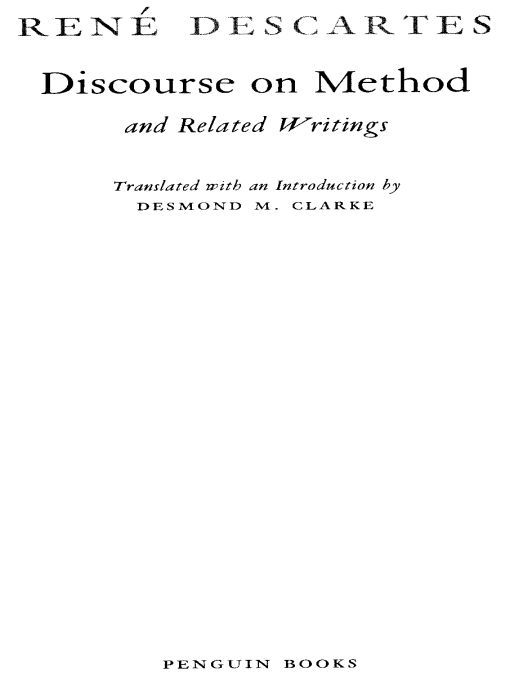
 CLASSICS
CLASSICS